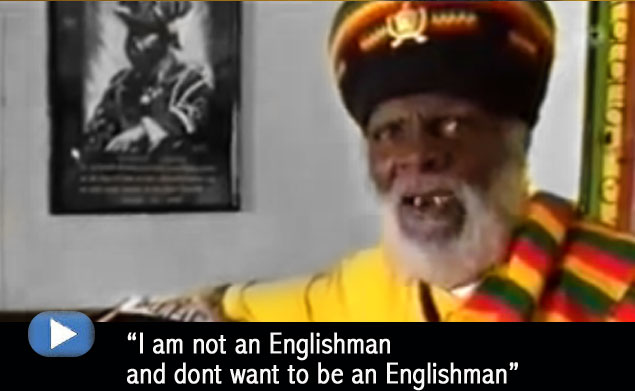Psalms 68:31 proclaims that ‘Princes shall come out of Egypt; Ethiopia shall soon stretch out her hands unto God.’ This biblical reference to the land of Ethiopia has been one of the main premises upon which Rastafarians have based their desire to go to Zion – a place of unity, peace and freedom; a place free of the chains of Babylon/oppression. For many Rastafarians and followers of the exodus movement, Africa, more specifically Ethiopia, represent as a land of freedom. Referred to as a ‘prophet’ by most Rastafarians, Marcus Garvey and his call for an exodus of all Blacks back to Africa and his declaration that ‘Africa for Africans,’ has long theorizes that only when Africans return back to their orijin, will they be free of bondage and enslavement. As a result, when Emperor Haile Selassie I donated 500 acres of his land in Ethiopia to interested settlers in Jamaica and other parts of the Caribbean to help them break free of the bondage of the colonial powers who oppressed them, many took advantage of the opportunity and settled in the promised land of Shashamane.
Upon hearing the news, many from the Caribbean began to trickle into Shashamane in hopes of returning to the land from which they were exiled and where they will finally be free from bondage. Over the years, many of African orijin from the U.S. and UK also began to arrive. While those who came to Shashamane had high expectations, things did not necessarily pan out for most as they expected.
Upon their arrival to the ‘Promised Land,’ many were faced by fierce resistance to their presence by the local residence. Many of these returning individuals, the majority of whom are Rastafarians from the Jamaica/ the Caribbean, were referred to as ‘farangi’, which is the Ethiopian word for foreigner. Instead of being able to live a peaceful life in harmony with their brothers and sisters, many of the new settlers in Shashemane were often met with resistance and rejection. This is still the case for many today. However, despite these noted issues, many of these settlers who remain in Shashamane do not regret their choice. Instead, many have chosen to embark on a path to bring their fellow Ethiopian brothers and sisters to a level of ‘consciousness,’ one that will enable them to see and accept the vision of Marcus Garvey of Pan-Africanism.
While the it has been estimated that over 2000 new settlers flocked to Shahshamane in the initial stages, due to ongoing issues, including having much of the land originally granted to them being taken away by the subsequent government (it has been estimated that their land has been reduced to 11-44 acres), recent estimates indicate that just under 500 settlers from the Caribbean and other parts of the Diaspora now reside in Shashamane. Despite the reduction in numbers, Rastafarians and repatriates in Shashamane still manage to maintain a very vibrant lifestyle. They have invested heavily into music, arts, culture and education not only for themselves and children, but also for their Ethiopian brothers and sisters. They have also embarked on implementing numerous projects including organic agriculture, electrical installations and numerous building projects. However, despite their efforts and projects, many still face hardships in the ‘Promised Land’ as many have to fight to gain citizenship.

Latest posts by Nekita (see all)
- Before Rihanna there was Grace Jones - December 27, 2014
- Marimba: Expression of Freedom, yet my Afro-Ecuadorians… - December 25, 2014
- Who Makes Claim to Being the Reggae Capital of the World? - December 24, 2014









